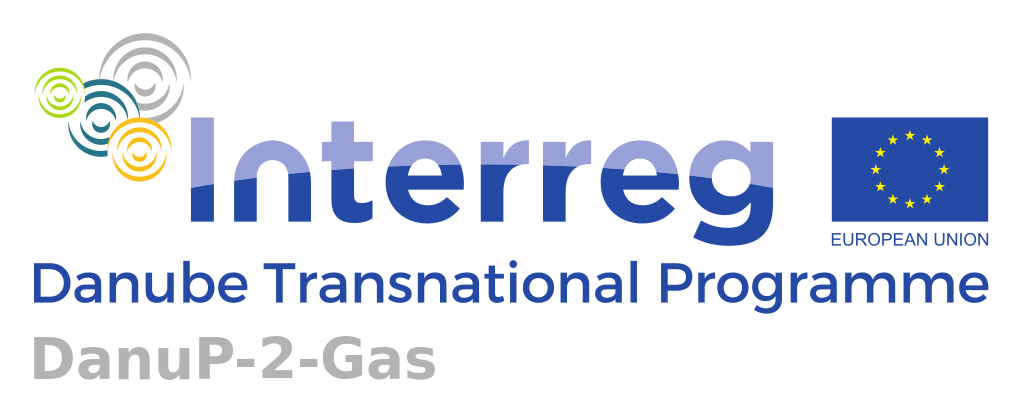
DanuP-2-Gas
The Danube Transnational Cooperation Program (DTP) in brief
The aim of the DTP is to strengthen socio-economic and territorial cohesion in the Danube Region. This region is of particular importance to Hungary, as one of the outstanding results of the Hungarian Presidency of the EU in 2011 was the Danube Region Strategy, based on 4 pillars, comprising nine EU Member States and five non-EU Member States. One of the main tools for the implementation of the Strategy is the DTP, which promotes the implementation of professional projects, the exchange of experiences, networking and the development of mutual dialogue between the countries concerned in the framework of international cooperation.
Objectives and expected results of the DanuP-2-Gas project
The Danube Region is a region rich in renewable energy sources, and it has significant built-in energy production capacities to take advantage of this. However, their efficiency is rather low in the absence of adequate energy storage solutions. In addition, the countries of the Region import energy from Russia mainly to meet their primary energy needs. In order to reduce energy dependence and greenhouse gas emissions, the DanuP-2-Gas project supports the more efficient use of alternative energy sources, the use of biomass and certain wastes in biogas production and contributes to their more effective integration into the energy market.
The main goal of the project is to develop strategies that promote the diversification of energy sources and strengthen the use of renewable energy sources in the Danube Region. It also promotes transnational cooperation with key partners in the project.
- Energy sector
- R&D institutions
- Public sector
- Market participants
The idea for the project was formulated in July 2018 based on the concept of an energy project, also implemented in DTP, Energy Barge (https://www.energy-barge.eu/). The aim is to expand the Energy Platform, where all information and data collected so far will be easily accessible to stakeholders involved in biogas production. The project will examine several aspects of biogas production and utilization to achieve all of these goals. The first is the production of biogas, as this process requires a significant amount of hydrogen, which can be produced most cheaply using electricity from renewable energy sources (mainly solar and wind) that is not otherwise used. The connection between the two sectors is synergistic: renewable energy sources can be stored through biogas production. The second main motive is to feed the biogas produced in this way into the natural gas network. From the technological point of view, the storage of natural gas is much simpler than that of electricity, and last but not least, storage capacities are already available, so the third main pillar of the project is the interconnection of electricity and natural gas networks and the necessary technological, legal and support framework.
The project thus promotes diversification in energy storage, and cooperation strengthens the flow of information / knowledge between actors, and also helps market participants and the public sector to develop future projects, both locally and transnationally. Together, they will contribute to a more efficient use of existing energy resources, increase the region’s energy independence, and the project will also help create jobs in areas where biogas production and storage takes place.
Milestones in the DanuP-2-Gas project
The project supports the application and diffusion of Power-to-Gas (P2G) technologies through a number of activities:
- collect and process suitable infrastructure elements and data on usable biomass available in the Danube Region in order to compile an implementation plan for the creation of nodes connecting the electricity and gas sectors;
- Map and evaluate the legal and policy regulatory framework of the Danube Region countries for better pairing of sectors, both gas and electricity networks, and develop transnational strategies outlining the interconnection potential of the sectors, in particular the future network infrastructure developments;
- as a summary step, the project brings together the current funding opportunities for biogas projects and previous project results, and proposes the development of future funding schemes and specific project proposals, building on the involvement of stakeholders (companies, public sector, NGOs). The aim is to strengthen the relationships established during the project and to facilitate long-term cooperation between the partners, to finance future investments and to apply the identified good practices in future projects.
The project results are available on the project website () and on the Danube Energy Platform website, as well as on the latest news on the DanuP-2-Gas Facebook page:
Duration of the project: 2020.07.-2022.12.
Total cost of the project: EUR 2 553 726
TCDA budget: EUR 126 947
Lead Partner: Technology Center Energy – University of Applied Sciences Landshut (Germany)
The project is supported by the European Union, co-financed by the European Regional Development Fund and the Hungarian State.
